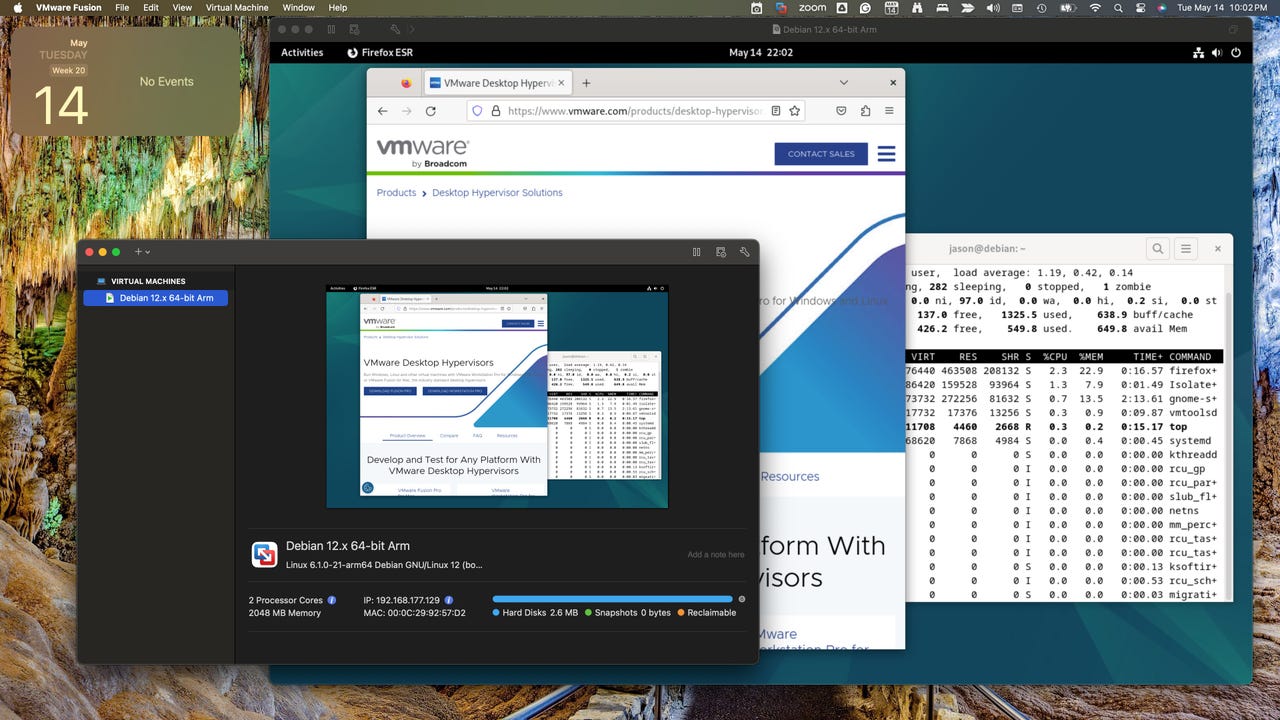VMware's Fusion Pro and Workstation Pro are now free for personal use - here's how to access them

Debian GNU/Linux running in VMware Fusion 13.5
In a move likely to significantly impact the virtualization and software development community, VMware has announced that its Fusion Pro (Mac) and Workstation Pro (Windows and Linux) products will be free for personal use. The surprising move signals a new era in which powerful virtualization tools are more accessible than ever, offering exciting opportunities for students, hobbyists, and independent developers.
VMware, now part of Broadcom following its acquisition in November 2023, previously announced that it would no longer offer free access to vSphere Hypervisor (ESXi), one of its most used products. The free version is no longer available on the VMware website, and the company will only provide support to paying customers. In addition, Broadcom has stopped selling perpetually licensed versions of VMware products and is now encouraging customers to choose software subscriptions.
Also: Locking down container security once and for all with Rust-based Edera
Broadcom probably decided to offer VMware Workstation and VMware Fusion for free to improve its relationship with customers who use ESXi for software development. Although small businesses that depended on the free version of ESXi no longer have access to it and might be unhappy about having to find an alternative free server-based hypervisor (such as the Linux KVM-based Proxmox, or FreeBSD and its bhyve) or pay for licenses, many developers will appreciate having access to these new desktop tools.
A brief history of VMware Workstation and Fusion
In 1999, VMware Workstation was launched for Linux, ushering in a new era of desktop virtualization. This allowed users of the open-source OS to run Windows on a virtual machine. In 2007, VMware Fusion was introduced for Mac users, further expanding VMware's innovative solutions. Until recently, VMware Fusion 13 Pro and VMware Workstation Pro 17 were priced at $199, positioning them as premium tools. VMware's main commercial competitor, Parallels, costs $99 to $119 annually, depending on end-user requirements.
What it means for developers and enthusiasts
Although there are free and open-source desktop virtualization solutions, such as Oracle VM VirtualBox, the KVM hypervisor in Linux, QEMU, and Microsoft's Hyper-V in Windows, VMware's Fusion and Workstation products have been considered the top choice for desktop hypervisors. These products allow users to run virtual machines on Windows, Linux, and Mac computers with accelerated paravirtualization drivers for graphics and networking, giving VMware an edge over its competitors. By offering these powerful tools for personal use at no cost, VMware is making advanced virtualization technology more accessible to a wider audience.
Also: Want more productivity? Help everyone think like a developer
Students, hobbyists, and independent developers can now access Fusion Pro and Workstation Pro for free. This shift enables individuals to experiment, learn, and innovate without financial barriers. VMware Fusion Pro and Workstation Pro support over 100 guest operating systems, including various versions of Windows, Linux, FreeBSD, Mac OS X, OS X, and macOS, on both x86 and Arm architectures.
A selection of Arm-based OSes can be installed on VMware Fusion 13 Pro.
Virtualization is a cornerstone of modern IT and computer science education. By offering free personal use licenses, VMware provides students with hands-on experience with industry-standard tools, enriching their education and better preparing them for future careers.
Additionally, many open-source initiatives rely on virtualization for testing and development. Free access to VMware's professional-grade tools supports these projects, fostering greater innovation and collaboration within the open-source community.
Also: Meet Hackbat: An open-source, more powerful Flipper Zero alternative
For many people, personal projects serve as a gateway to professional development. Access to Fusion Pro and Workstation Pro allows users to build skills and projects that directly translate to career advancements, bridging the gap between personal interests and professional growth.
Player is now discontinued
With this announcement, VMware is discontinuing the lesser-featured Workstation Player and Fusion Player. Current users of these versions can upgrade to the Pro versions at no additional cost, unlocking a suite of advanced features and enhanced capabilities.
How to get the products
Users can download VMWare Fusion 13 Pro and VMWare Workstation 17 Pro from the Broadcom Support Portal.
Users must register on the Broadcom support portal to download VMware Fusion Pro and Workstation Pro for personal use. This registration grants access to the full versions of these powerful tools. While this signup process means you will be included in Broadcom's marketing lists, it's a small trade-off for software that previously cost $199.
While most Linux distributions and FreeBSD are free to install on VMware, a Windows 11 Pro license with an activation key costs between $30 and $199, depending on the reseller or if you buy one directly from Microsoft. Read Ed Bott's excellent guide on Windows 11 activation here.
Also: Implementing AI into software engineering? Here's everything you need to know
VMware offers free personal use licenses, but it operates on a paid subscription model for commercial use. This two-tiered licensing system ensures that businesses and organizations relying heavily on these tools contribute to their ongoing development. The annual subscription fee of $120 provides commercial users with licensing, continuous updates, and support, ensuring the reliability of these tools for critical applications.
A welcome consolation prize by Broadcom
Even though ESXi, VMware's flagship hypervisor product, is no longer available for free, the fact Fusion Pro and Workstation Pro are now offered for personal use for free represents a major development in the virtualization field for many end users. With Broadcom now overseeing VMware, the company is in a position to promote a new era of creativity and skill advancement by making advanced virtualization tools accessible to everyone.
As the tech community adapts to this new reality, it will be fascinating to see innovations and developments that arise from expanded access. VMware's commitment to supporting personal and commercial users ensures a dynamic and robust ecosystem where everyone can benefit from cutting-edge virtualization technology.
